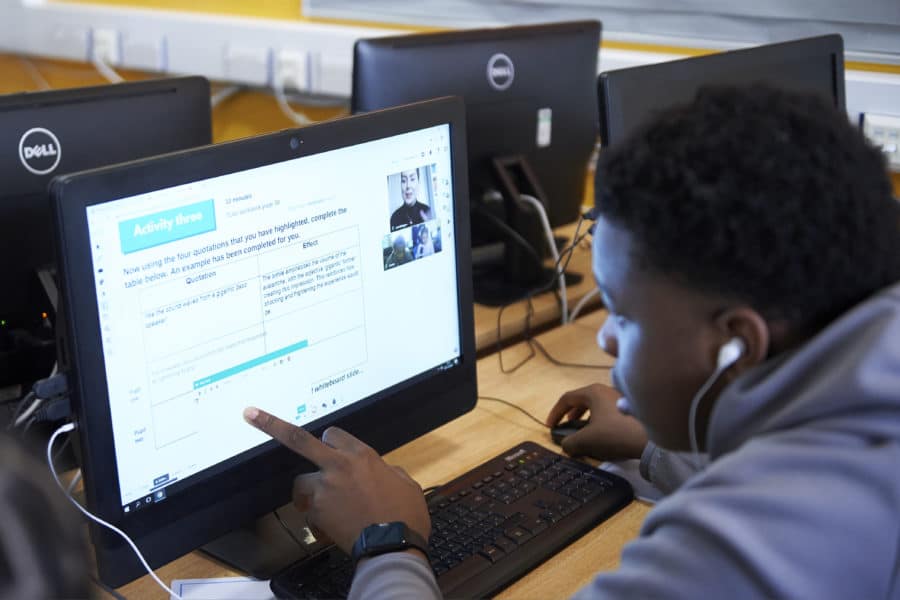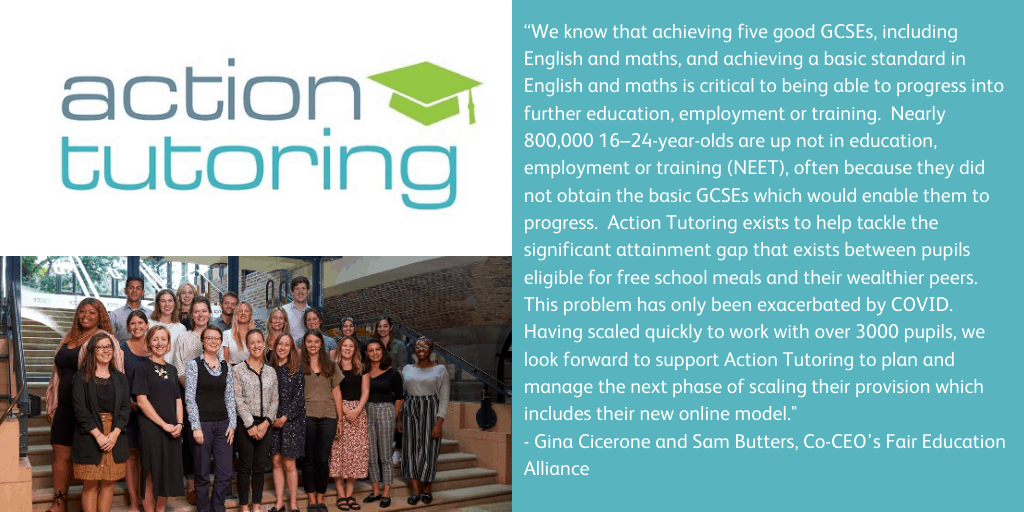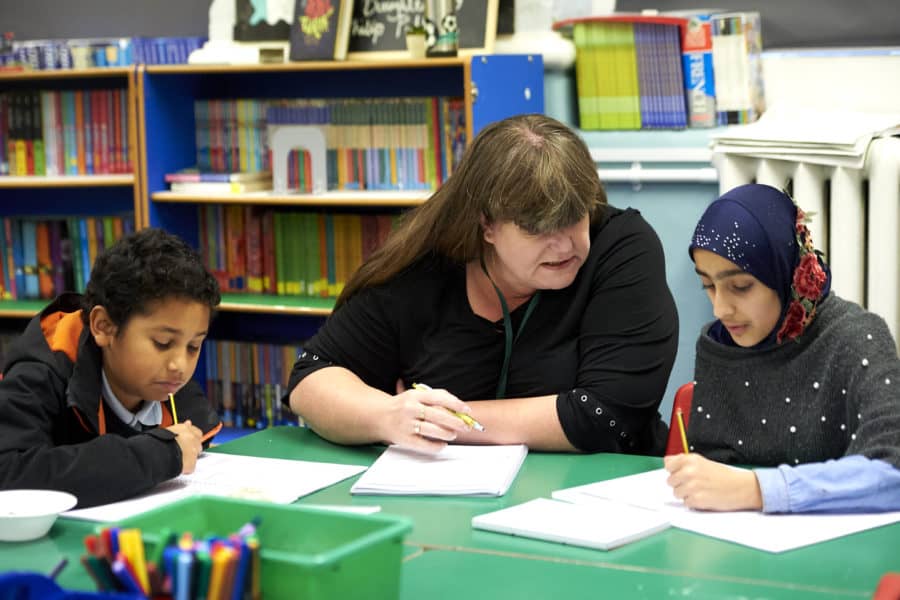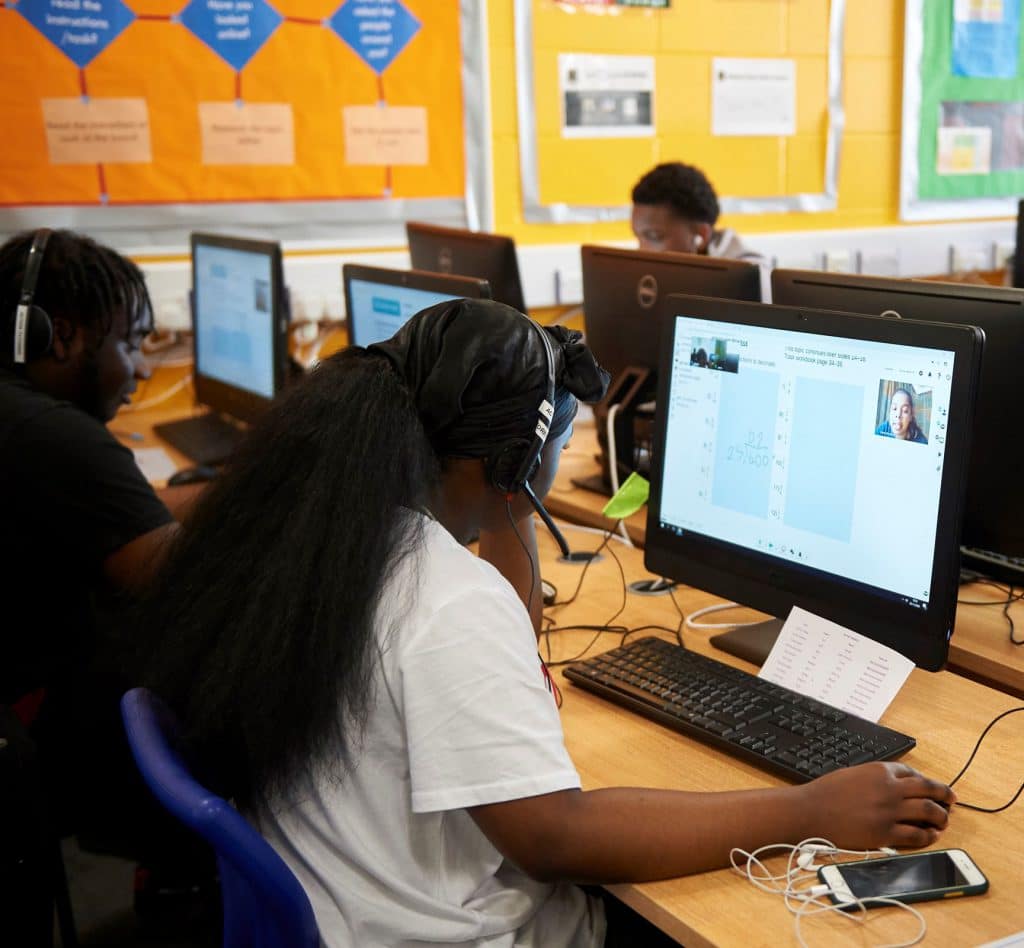Positive findings from the EEF report on effectiveness of online tuition in supporting disadvantaged pupils to learn remotely
12 February 2021
Delivering online tuition can be an effective way to support the learning of disadvantaged pupils during partial school closures – if supportive measures are in place – according to a new report published today by the Education Endowment Foundation.
The report evaluates the reach of the National Online Tutoring Pilot, commissioned by the EEF in partnership with the Sutton Trust, Impetus and Nesta, to support disadvantaged pupils’ learning during and after partial school closures in the first national lockdown. Its aim was to test the feasibility and promise of online tutoring to support learning while pupils, in particular those from low-income backgrounds, were unable to access school in the normal way. It was the first study to look solely at online delivery in England.
The pilot was delivered from June to October 2020 by Action Tutoring and My Tutor, The Access Project and Tutor Trust. In total, the pilot reached 1,425 learners in 65 schools, with 9,800 tuition sessions delivered. The vast majority of pupils were studying for their GCSEs in Years 10 and 11 (ages 14-16). Most pupils received weekly one-to-one sessions on maths, English or science. The majority of pupils receiving tuition were eligible for Pupil Premium funding.

The independent evaluation by NatCen lists five key conclusions:
- Delivering online tuition during the period of partial school closures was feasible, with high reach in the circumstances.
- Access to equipment and reliable internet connections were key barriers to participation, particularly for home-based learners, despite the best efforts of schools. Almost half (48%) of schools reported lack of equipment as a challenge.
- Pupils enjoyed the tuition and there were perceived benefits for learning, with improvements in learners’ confidence, engagement with education and preparedness for new school year reported. The overwhelming majority (87%) of learners said that, if they had the opportunity, they would like to carry on with their tutoring. Three-quarters (76%) said they enjoyed learning more than they did before.
- Investing time in building effective relationships between schools and families were crucial in supporting take-up and engagement.
- Face-to-face tuition is preferred by both tutors and learners to online tuition.
The EEF is delivering the National Tutoring Programme Tuition Partners pillar, which offers subsidised face-to-face and online tutoring to schools from an approved list of 33 Tuition Partners, including Action Tutoring. While there are some key differences between this pilot and the NTP model, notably that some of the tutoring in the online pilot was delivered in the summer holidays rather than in term time, today’s findings provide valuable insight into the benefits and barriers to online delivery.
Since its launch in November 2020, the NTP has been clear that tutoring – whether online or face-to-face -should take place in school wherever possible, to minimise the barriers highlighted by today’s report. However, with schools currently closed to most pupils, almost all Tuition Partners are offering online at-home tuition to ensure that pupils can still benefit in this period of disrupted learning.
The pilot was co-funded by the EEF, alongside Wellcome Trust, Paul Hamlyn Foundation, the Hg Foundation, Porticus UK, the Dulverton Trust, the Inflexion Foundation and other funders.
Policy update: November 2020
20 November 2020
Government launches flagship scheme to tackle COVID learning-loss
The government has now launched its multi-million-pound effort to help disadvantaged pupils catch up on learning they’ve lost during the pandemic through the National Tutoring Programme. Action Tutoring, now an official provider under the programme, was closely involved in campaigning for catch-up provision and is glad that the strong evidence for tuition boosting pupils’ progress has been recognised.
The full list of 33 providers – who underwent a lengthy assessment process – was published earlier in November. It includes charities like the Tutor Trust, The Access Project, CoachBright and Brilliant Club, as well as private tutoring firms. Pupils access tuition when their school approaches any of the official tuition partners, who must deliver at least 15 sessions for each pupil this year to access the funding. The provision will be heavily subsidised for schools, who will contribute 25% of the cost. The Department for Education has issued a notice calling for ideas on how to extend the programme as they look to make a decision on its future.
The pandemic has significantly affected children and young people of all ages, worsening existing inequalities. We know that efforts to repair the damage must continue beyond summer 2021 if the NTP is to have a significant legacy and make a sustained difference. The Fair Education Alliance is calling on the government to extend the NTP and our CEO, Susannah, has co-signed a letter to the prime minister calling for an extension. The 2020 Spending Review will conclude next week and could offer some additional funds for catch-up in 2020–21.
If you are curious to learn more about the NTP, like which subjects are covered or the quality criteria used to assess providers, check out the NTP website.
The campaign against holiday hunger
You may have been following the high-profile campaign to provide free meals outside term time to school children from low-income families. The fact that so many children and families rely on free school meals is heartbreaking and the pandemic has worsened deprivation, with hundreds of thousands more children becoming eligible this year.
The campaign has been driven forward by 23-year-old footballer Marcus Rashford, alongside charities and think tanks focussed on alleviating child poverty. The campaign already saw great success when the government changed its course and provided meals over the summer holidays, having previously said that increased welfare was reaching these families via other routes.
Rashford launched a petition to expand support further, which gathered over a million signatures. However, the government voted against extending free meals over the half-term break, prompting an overwhelming public response and many businesses and councils stepping forward to offer free lunches.
On 8th November, in a victory for campaigners and children in need, the government changed its position and announced a large support package to address hunger – including a £220 million extension of the holiday activities and food programme in 2021 and a £170 million winter grant scheme to help families facing hardship pay for food and bills.
Of course, questions remain over how the additional funding will be deployed effectively to reach those with greatest need, and how holiday hunger will be addressed beyond the pandemic. Holiday hunger and the considerable need for free school meals is not a new issue in 2020. Important charities, like the Trussell Trust and Magic Breakfast, work hard to deliver nutritious meals to disadvantaged children year round, so nothing gets in the way of them learning and flourishing.
What will happen to exams?
Last summer, the cancellation of exams and the alternative grades awarded had a big impact on young people. Already affected by the pandemic, GCSE and A Level pupils were heading into an uncertain future, without having had the chance to obtain the grades they’d worked for – many not equipped to make alternative plans or navigate the appeals system.
Elsewhere in the UK, in light of how much education has been affected, governments have already taken the decision to cancel exams in 2021. GCSE and A Level exams in Wales will be replaced with classroom assessment and National 5 exams in Scotland will be replaced with teacher assessment and coursework. Meanwhile, in England exams are still set to go ahead, although three weeks later than usual. A survey conducted by LSE suggested strong public support for exam reform, to ensure the 2021 cohort are treated fairly. After a consultation earlier this year, exams regulator Ofqual has made a number of small modifications to how certain subjects will be assessed.
The Education Policy Institute has made some practical recommendations to help make exams fair and deliverable, like offering pupils choices between questions if they’ve not covered a topic and spacing out papers as much as possible. The report also offers a contingency, including more standardised mock exams as a fallback. Action Tutoring volunteers will be working with pupils for as long as possible this year, supporting them to get them back on track in their subject and improve in confidence, regardless of how or when their learning is assessed.
Additional reading…
The impact of lockdown on attainment
Research suggests that disruption to schooling during the pandemic has already resulted in a significant decline in attainment among pupils. In particular, younger year groups and those eligible for the Pupil Premium have shown the largest average declines in attainment levels, as well as those attending schools in deprived areas or in the North and Midlands. To combat this loss of learning and ease the transition to secondary school, Action Tutoring is supporting significantly more Year 7 pupils this year.
New legal duty to educate children at home
The Department for Education has made it law that schools have to provide the same education to children at home and in the classroom – though schools still face big obstacles to ensuring every pupil can access remote learning effectively, particularly around technology.
NEU campaign for schools to close
At the start of the month, the National Education Union launched a campaign for schools to close during the four-week lockdown, gathering over 150,000 signatures from teachers and support staff. It also called for a rota system to be in place for secondary pupils at the end of lockdown, to reduce the spread of the virus.
Reversing cuts to school funding
The Institute for Fiscal Studies published its annual report examining education spending and found that, with the extra £7.1 billion allocated to schools in England in 2022–23, this year’s funding increases will just about reverse the cuts experienced since 2009–10. Further Education has suffered the greatest cuts of all education stages.
Comparing policy responses
The Education Policy Institute released a comparison of different education policy responses to the pandemic, highlighting how different governments in the UK have sought to balance education and public health.
Online tutoring can be a powerful tool to help pupils affected by school closures, study finds
22 October 2020
A successful pilot project conducted by the Education Endowment Foundation, Impetus, The Sutton Trust and Nesta has shown that online tutoring can be extremely effective in supporting pupils’ learning that has been disrupted by the Covid-19 pandemic.
The project aimed to test the feasibility and promise of online tutoring as a way to support learning under lockdown during summer term and holidays. Action Tutoring and four other charities took part in the study to support over 1,300 primary and secondary school pupils earlier in the year.
In total, more than 7,000 lessons were delivered to a variety of year groups, ranging from Year 5 to Year 11. The EEF’s Teaching and Learning Toolkit, an accessible summary of educational research, shows that high-quality tutoring can deliver approximately five months of progress on average.
Implementing learnings from this initial test phase, Action Tutoring then launched its first full online programmes in October. The study showed that online tutoring had a positive impact on the disadvantaged pupils supported.

Nine in ten children say tutoring helps with their schoolwork. Pupils say what they particularly like about tutoring is the one-to-one support for issues they are struggling with, the reduced fear of peer judgment and the flexibility to learn at their own pace.
In the 65 schools that took part in the pilot project, the majority of pupils supported were disadvantaged children – 81% of those in primaries and 69% of those in secondary schools.
The pilot project was co-funded by the EEF, alongside Wellcome Trust, Paul Hamlyn Foundation, the Hg Foundation, the Dulverton Trust and the Inflexion Foundation and was independently evaluated by NatCen Social Research.
“Online tutoring with Action Tutoring has allowed pupils to get personalised intervention in maths, increasing their engagement in a subject they don’t find easy. The few weeks of online tutoring has made a huge difference in their confidence and attainment in key topics in maths.”
Rakhee Dattani, Head of Maths at Arts and Media School, Islington, London
The National Tutoring Programme (NTP), which aims to make high-quality tutoring available to schools to help disadvantaged pupils whose education has been affected by school closures, will build on the pilot’s findings when it launches on 2nd November.
Professor Becky Francis, Chief Executive of the Education Endowment Foundation, said: “This study shows that online tutoring can be an essential tool to support pupils and teachers this academic year. Until social distancing restrictions relax, online tutoring offers a flexible and much needed way to get tutoring into schools across England.”
Professor Francis added: “Schools are best placed to decide which pupils need help the most and what type of support is suitable. Each child will have different needs – some will respond better to online tuition others to in-person support. This is why the NTP will provide teachers with a menu of options from an approved list of high-quality providers that schools can choose from.”
To join us as an online tutor to help support with the Covid-19 catch up, apply now through our application form.
Schools and charity partnerships: Challenges and solutions
25 September 2020
The impact of the pandemic has been wide-reaching. Schools have been significantly affected, having to respond instantly to establish remote teaching and now working to support pupils catch up from the learning they have lost. Action Tutoring, and many other educational charities are eager to contribute positively to this effort but support must be delivered in the right way to make a meaningful difference.
The Centre for Education and Youth and Action Tutoring recognised that good relationships between charities and schools can have a significant impact on pupils’ learning and wanted to harness best practice and guidance from the field to help others benefit.
Earlier in the year we brought together expert voices in a roundtable discussion. 18 charity and school leaders, across the primary and secondary sectors, took part to discuss partnerships and share best practice. We produced a joint report, highlighting the key findings from the event, which provides tips for best practice in four areas:
- Building a reputation: a charity’s reputation is extremely important for building connections with schools.
- Building strong relationships: effective communication plays a crucial role in helping charities and schools build relationships.
- Working together: schools and charities should plan how they will work together at the start of their partnership and should clarify any non-negotiables.
- Evaluating impact: schools and charities should work together to collect meaningful data and measure impact.
You can read the full report here.
You may also like to watch the discussion in full here.
Action Tutoring: Fair Education Alliance Scaling Award Winners
27 July 2020
Action Tutoring is thrilled to have been announced as one of seven winners for this year’s Fair Education Alliance Scaling Award!
Action Tutoring is honoured to have been granted this award, a two-year accelerator programme designed to provide bespoke support for deepening charities’ impact. The programme draws on the expertise of the Fair Education Alliance’s extensive network of members and supporters. The team at Action Tutoring is excited to connect, learn and ultimately extend its reach to more pupils in need.

Learn more about the programme and seven winners here.

Determined to Change, Determined to Sustain: Black Lives Matter at Action Tutoring
10 July 2020
Last month, Action Tutoring put out a statement in support of the Black Lives Matter movement. Since then, our entire organisation has been working together to find ways to take anti-racist action both in the short and long term.
In our earliest meetings, we discussed the need for both immediate, purposeful change and for a sustained commitment to our pledges and actions. We agreed that we need to do so much better, but knew all changes had to be meaningful, well implemented, and long lasting.
We formed three cross-organisational working groups, each focusing on a key area of the charity: our pupils and resources; volunteer tutors; and staff. Between weekly whole-team conversations, these groups have been meeting more regularly to reflect on the current limits of our work, to read and research, to brainstorm ideas, and to turn our observations into actions. In the short term, this has manifested itself in a number of ways. For example:
- We are reaching out to MPs across the country asking them to champion measures to tackle systemic racial inequality and commit to sustained scrutiny of policies that disadvantage Black children and young people, as well as those from all other minority ethnic groups.
- Two sub-groups are combing through every workbook to audit their cultural representation and messaging. This research will inform changes to help improve our resources. Any new resources we produce (such as for half-term catch-up days) will follow new diversity criteria.
- We have created a group to centre anti-racism in staff learning and development. Staff will meet regularly to share reading, webinars, policy, and history and discuss what we’ve learned in relation to anti-racism in our work and sector.
- We are creating diverse suggested reading lists for pupils. These will also be useful for tutors who may ask us about the kinds of texts they could bring to sessions for ‘reading for pleasure’ activities.
- We are adding a clause on anti-racism to Action Tutoring’s school partnership agreements, laying out our expectation for staff and tutors from Black and other minority ethinc backgrounds to be protected from racism. Although we hoped this would be implicit, we realise we must make it explicit.
As for the longer term, we have plenty of ideas in the pipeline and are currently researching the best ways to carry them out. Some of our thinking includes:
- Creating an additional training based on recognising and tackling unconscious bias. All our staff already undertake unconscious bias training but we would like to share the principles with our volunteers.
- We are examining how we could improve our hiring practices to ensure our staff body is more inclusive, representative, and enriched by greater diversity. We recognise the precedence this must take whilst also thinking about the diversity of our volunteers.
- We are exploring ways to diversify our volunteer pool to further enrich and expand the experience of our pupils and strengthen our community. We are putting together focus groups for different stakeholders to hear their experiences of the organisation and their ideas for building actively anti-racist practices into our community. If you would like to contribute, please contact us at hello@actiontutoring.org.uk.
- We commit to ensuring all resources we produce from now on meet a new set of diversity criteria to promote healthier and proportional representation.
We are committed to making sustained anti-racist action central to how we work, recognising where we have failed in the past and being held accountable for any mistakes. We welcome any input from you into how we can further this work.
Action Tutoring’s response to government catch-up plans
19 June 2020
The school closures have had a huge impact on pupils, especially those from disadvantaged backgrounds, with recent reports suggesting as many as 2 million pupils have done almost no school work during lockdown.
At Action Tutoring we have been highlighting the impact of this on disadvantaged pupils in particular, since schools were closed in March, and have been calling on the government to provide catch-up support. We are therefore delighted that today it has announced a national tutoring programme for disadvantaged pupils and the additional funding for schools to spend more broadly on catch-up.
We are ready to play our part in this vital catch-up and would be delighted to hear from new schools and new volunteers interested in working with us to reach as many young people as we can. We are optimistic that with this package of funding and the fantastic organisations who deliver academic support that all pupils stand a strong chance of reaching their full potential.

Action Tutoring begins the testing phase of its online tutoring development
15 June 2020
Action Tutoring is thrilled to have begun the testing phase of its online tutoring development this week. Expanding its tutoring programme delivery to online, as well as in person, was already part of Action Tutoring’s strategic plans before the crisis hit, but the charity has now refreshed the timescales to enable it to deliver the provision much sooner.
The charity currently supports almost 3,000 disadvantaged pupils each year, however just over 78,000 disadvantaged pupils across the country do not achieve English and maths at GCSE each year and could also benefit from this support. These young people are less likely to achieve the grades they need to progress in life, but academic tutoring can help them to do this. Action Tutoring has already developed an impactful face-to-face tutoring model. By expanding its provision to be delivered online, it can ensure many more young people, outside of the cities where it currently operates, can benefit from its support. The current pandemic has prompted Action Tutoring to accelerate the development of its online delivery, so that pupils can be supported as soon as possible even while social distancing rules are still in place.
Susannah Hardyman, CEO and founder of the charity, said: “We are delighted to be ready to test our online delivery. The team has worked exceptionally hard to get to this point, in such a short timeframe. This is an essential new offering for our charity, enabling us to bring tutoring support to even more disadvantaged young people across the country at a time when it is so needed.”
Action Tutoring will be using this test period as a learning and preparation phase to ensure it is ready to roll out online tutoring more widely in the autumn. The charity has engaged six primary and secondary schools to work with over the testing period, across three different cities. With support from over 60 of its existing inspiring volunteer tutors, up to 86 Year 6 and Year 10 pupils will be able to receive online tutoring over a five-week period.
Pupils will be set up on computers in their schools or at home and receive tutoring from volunteers who are located anywhere across the country. Tutors will be able to support up to two pupils at a time and the sessions will be delivered using the Vedamo online platform. Action Tutoring has invested in this diverse online platform which has fantastic functionality, meaning the provision will be as close to face-to-face delivery as possible. Action Tutoring has already developed a suite of tutoring workbooks, for its pupils and tutors, to cover relevant maths and English topics. These will be uploaded onto the platform for the tutors and pupils to use.
This structure was decided to help mirror the charity’s face-to-face delivery as closely as possible. By having the pupils located together, in school, it can ensure there are teachers and other staff members present to support with any issues and monitor the quality of the tutoring being delivered in a learning environment. It also helps the pupils to feel supported and not isolated when receiving the help. In the short term this delivery approach also allows tutoring to continue while external volunteers are prevented from entering the schools due to social distancing restrictions. Action Tutoring will be providing noise-cancelling headphones and graphics sheets (maths-specific) for pupils participating.
Action Tutoring will also be testing ‘at home’ tutoring with one of the participating schools. Although the charity’s long-term aim is for pupils to all receive tutoring at school, by testing the product with pupils at home it ensures delivery can be adapted should the external situation force this.
Action Tutoring is incredibly grateful to its six partner schools who have agreed to participate in the test phaset:
Pakeman Primary School – London
Bedminster Down Secondary School – Bristol (home-tutoring)
Seaford Secondary School – Sussex
Arts and Media School Islington – London
Queensbridge Primary School – London
Prendergast School Secondary – London
Their support and patience will enable the charity to rigorously test its new platform and delivery methods to ensure it is fit for purpose in the autumn.
“We have been delighted with the impact Action Tutoring has had on the progress of our Key Stage 4 pupils. We saw a marked increase in confidence and engagement from those pupils who attended the sessions. The support of tutors in a small-group setting has proved invaluable to our young people. We are therefore excited to be participating in Action Tutoring’s new pilot. This will ensure pupils will be able to get support during this time of remote learning.” Susan Service, Headteacher, Arts and Media School Islington, London
Action Tutoring would not have been able to start this development without the financial support from generous public donations and fundraising efforts and some crucial contributions from other funders including: UBS, Wellington Management Foundation, The Fore and Nesta. It is incredibly grateful for these offerings, particularly given the current economic pressures on organisations and society.
“At UBS we recognise the difference that skills-sharing can make in overcoming disadvantage. That’s why we’ve supported Action Tutoring in their growth across London. We’re proud to support an organisation which strongly believes that no child’s future should be limited by their background, and which has developed a powerful programme to do something about it. Sadly the issue looks set to be exacerbated by the consequences of the global pandemic. We’re pleased that our grant will go towards ensuring that young people who need it most will continue to receive support through Action Tutoring’s new online offering.”
The charity is incredibly grateful for the inspiring volunteers who have generously given their time to support this pilot and to its passionate and dedicated staff team who have committed to delivering it. The charity would also like to thank Impetus, the Access Project and the other organisations and charities who have contributed through their advice and guidance in the development phase.
“I am delighted to be involved in Action Tutoring’s online tutoring test phase because it is an opportunity to try to remedy in a small way the damage done to children’s education by the COVID-19 school closures and also, if successful, in the longer term it could allow Action Tutoring to support many more disadvantaged pupils. Preparing for tutoring has been a learning experience for me – it turns out that writing fractions on a virtual whiteboard is a lot trickier than on paper!” Sarah, Action Tutoring tutor, London
This forms part of a wider pilot run by the Education Endowment Foundation (EEF), Sutton Trust, Impetus and Nesta which is engaging four organisations, and their different online delivery models, to assess the potential for online catch-up tuition to mitigate against the impact of school closures on the attainment gap. The outcomes from all four of these provisions will be independently evaluated by NatCen.
Action Tutoring will spend the summer months implementing its learnings from the testing phase and ensuring the platform is ready to launch, alongside its face-to-face delivery option, in the autumn. It is keen to recruit as many volunteers as possible for both online and in-person delivery, to be ready for September, so that as many pupils as possible can benefit from tutoring support and together we can help make up for the time they have lost.
To apply to join Action Tutoring as a volunteer tutor (either face to face or online), simply complete this short application form: www.tfaforms.com/332860
#BlackLivesMatter: Our statement
4 June 2020
Black lives matter.
We stand in solidarity and support with our Black colleagues, Black teaching partners, Black volunteers, Black pupils and the whole Black Community.
We have never and will never tolerate racism. We exist to tackle inequality in education and we are committed to ensuring every child is given the same, equal and fair opportunities to succeed in life.
Like our friends @TeachFirst, we know it’s not just about achieving meaningful grades and having access to jobs, but about removing structural bias and inequality. We know that in order to make long-lasting change, we need more Black and BAME decision makers in education policy, in our volunteer community and in our staff team.
Education plays a crucial role in defeating racism and we have a duty to ensure we tackle it head on whenever we encounter it. We stand together.
Action Tutoring submits evidence to Education Select Committee
4 June 2020
In May 2020, Action Tutoring was asked by Robert Halfon MP – Chair of the House of Commons Education Select Committee – to submit evidence for the Committee’s inquiry into the impact of COVID-19 on education and children’s services.
The inquiry will look at how the outbreak of COVID-19 is affecting all aspects of the education sector and children’s social care system. It will scrutinise how the Department for Education is dealing with the situation.
It will examine the impact of decisions such as school closures and exam cancellations in both the short term and the long term, particularly for the most vulnerable children.
Susannah Hardyman, CEO and founder of Action Tutoring says, “Early research is already showing that the pandemic will impact disadvantaged pupils the hardest. It’s essential that we, and other relevant organisations, are able to put forward our evidence and knowledge from the field, so that the government can make effective decisions and take impactful actions in response. With the delivery of our recommendations, and all others put forward, we can help to minimise the negative effect this crisis will have on disadvantaged young people and help them catch up after the time lost.”
Action Tutoring believes, and evidence suggests, that disadvantaged pupils, like those supported by the charity, will be the hardest hit by the crisis. A study by the Institute for Fiscal Studies suggests that children from more affluent families are spending 30% more time on home learning than are those from poorer backgrounds. By June, they will have had more than seven full school days’ worth of extra learning. The absence of education, and other means of support at home, like private tutoring, is simply pushing them further behind.
It is vital that the government prioritises its support for disadvantaged pupils once schools reopen and protects the diverse network of services that contribute to their learning and wellbeing, including charities.
Action Tutoring provided evidence in five distinct areas and submitted five recommendations of next steps. You can read the full submission here and a summary of the recommendations below. It is also available on the UK Parliament website here.
- Provide additional funding to schools in addition to Pupil Premium funding, for catch-up programmes for disadvantaged pupils next academic year – especially those moving into secondary school, or sitting national exams in the summer. This may be required for additional years.
- Consider what adjustments need to be made to national exams next summer – especially the grade boundaries – to account for lost learning time. Disadvantaged pupils must be protected and the attainment gap should not be allowed to widen any further than a reasonable variation compared with recent years.
- Extend financial support to charities serving disadvantaged pupils so they can adapt their delivery and cope with the changing needs of schools and pupils.
- Ensure all pupils have the equipment and access to technology they need at home to support remote learning, if required again.
- Promote a national volunteering campaign, raising awareness of charities like Action Tutoring enabling pupils to catch up.





